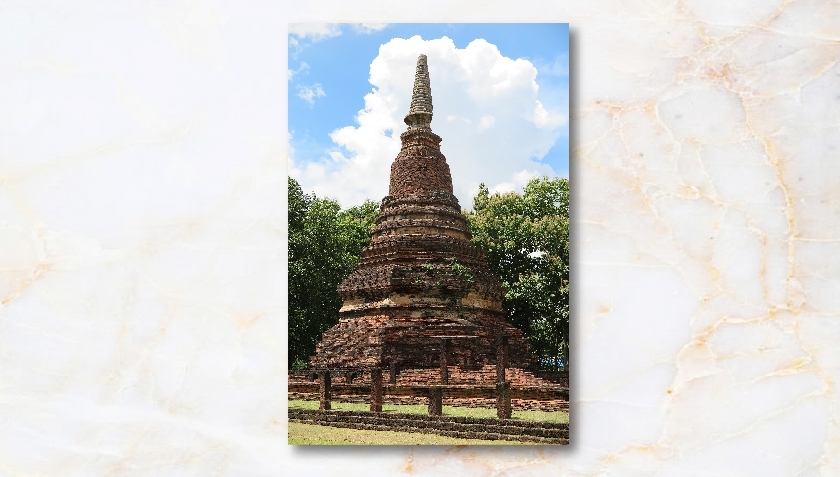Bell-shaped Stupas of Kamphaengphet School: An Amalgam of Sukhothai, Lanna and Ayutthaya Art Styles
Keywords:
Bell-shaped Stupas, Kamphaengphet SchoolAbstract
Kamphaengphet was an important city in the Sukhothai period. After the Sukhothai kingdom merged into the Ayutthaya kingdom, the city remained important as a center connecting Ayutthaya with Lanna. Thus, the art works of Kamphaengphet portray a mixture of Sukhothai, Ayutthaya and Lanna art styles. One significant example is the city’s stupas which are called “the bell-shaped stupas of Kamphaengphet School ” and were built around the 16th century A.D.
This group of stupas can be further categorised into three groups, as follows :
Group I Bell-shaped stupas with a mixture of Sukhothai and Ayutthaya styles (the stupa with surrounding lion figures): This category has three tiers of sloping moldings and a square form above the bell-shaped form that is reminiscent of Sukhothai-styled bell-shaped stupas. However, the usage of lions as decorations shows an influence from Ayutthaya.
Group II Bell-shaped stupas with octagonal bases (the typical type of Kamphaengphet): This group shows an amalgam of Sukhothai and Haripunchai-Lanna art styles. Their important characteristics are a multi-tiered octagonal base decorated with large pointed moldings.
Group III Bell-shaped stupas with a mixture of Sukhothai and Lanna art styles (the stupa with a set of Lanna-styled bases): The important features of this group is a three-tiered lotus base supporting a bell-shaped form, derived from Lanna-styled bell-shaped stupas
References
กรมศิลปากร, 2527. “จารึกฐานพระอิศวรเมืองกําาแพงเพชร.” จารึกสมัยสุโขทัย. กรุงเทพฯ: กรมศิลปากร.
คณะกรรมการอํานวยการจัดงานฉลองสิริราชสมบัติครบ 50 ปี, 2542. ประชุมพงศาวดารฉบับกาญจนาภิเษก เล่ม 2. กรุงเทพฯ: กองวรรณกรรมและประวัติศาสตร์ กรมศิลปากร, คณะกรรมการอํานวยการจัดงานฉลองสิริราชสมบัติครบ 50 ปี จัดพิมพ์เป็นที่ระลึกเนื่องในมหามงคลสมัยฉลองสิริราชสมบัติครบ 50 ปี พุทธศักราช 2539.
พระยาประชากิจกรจักร, 2507. พงศาวดารโยนก. พิมพ์ครั้งที่ 5. พระนคร: คลังวิทยา.
พระรัตนปัญญาเถระ, 2510. ชินกาลมาลีปกรณ์. (แปลโดย แสง มนวิทูร). พิมพ์ครั้งที่ 2. กรุงเทพฯ: กรมศิลปากร.
ศักดิ์ชัย สายสิงห์, 2558. เจดีย์ในประเทศไทย : แนวคิด คติการสร้าง พัฒนาการทางรูปแบบ และการวิเคราะห์ทางประวัติศาสตร์. นครปฐม: สนับสนุนทุนวิจัยโดยสถาบันวิจัยและพัฒนา มหาวิทยาลัยศิลปากร ประจําปี พ.ศ. 2556-2557.
ศักดิ์ชัย สายสิงห์, 2556. พระพุทธรูปในประเทศไทย รูปแบบ พัฒนาการ และความเชื่อของคนไทย. กรุงเทพฯ: ภาควิชาประวัติศาสตร์ คณะโบราณคดี มหาวิทยาลัยศิลปากร.
สันติ เล็กสุขุม, 2548. “ศิลปะที่เมืองกําแพงเพชร ส่วนผสมของศิลปะอยุธยากับศิลปะล้านนา.”, รวมบทความ มุมมอง ความคิด และความหมาย : งานช่างไทยโบราณ (หน้า 82-86). กรุงเทพฯ: เมืองโบราณ.
สันติ เล็กสุขุม, 2540. ศิลปะสุโขทัย. กรุงเทพฯ: เมืองโบราณ.
สันติ เล็กสุขุม, 2550. ศิลปะอยุธยา : งานช่างหลวงแห่งแผ่นดิน. พิมพ์ครั้งที่ 3. กรุงเทพฯ: เมืองโบราณ.

Downloads
Published
Issue
Section
License
บทความนี้เป็นผลงานของข้าพเจ้าแต่เพียงผู้เดียว และ/หรือเป็นผลงานของข้าพเจ้าและผู้ร่วมงาน ตามชื่อที่ระบุในบทความจริง และเป็นผลงานที่มิได้ถูกนำเสนอหรือตีพิมพ์ที่ใดมาก่อน




